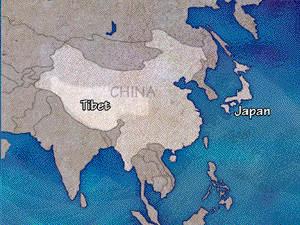Japanese Chins
Breed: Japanese Chin
Temperament: independent, lap dog
Cost: $300 plus
Lifespan: 10 years
Recommended for: older people, singles and families with older children
Dumpage rate: low
Popularity: increasing, ranks 83 out of 174 breeds in Australia
Maintenance: low to medium
Appearance
The Japanese Chin is a small dainty breed with high stepping gait. It has a compact carriage (describing the manner in which it carries its head and shoulders). The head itself is large, with big dark eyes. Its face is slightly pushed in. The breed has a luxurious coat with a thick mane and feathering on upper legs. It is available in two colour combinations:
black and white; and
red and white (red covers all shades from sable through to lemon and orange).
Adults stand 20 to 23cm tall (8-9″) and weigh 3kg (7lb).
Temperament
The Chin is a happy, good natured dog, which is gentle and affectionate with its owner, making it an ideal companion. It can be lively in play, but is intelligent and independent and is fair at obedience and working ability. The Chin is protective, and will sound the alarm if a stranger approaches.
Health and lifespan
The Japanese Chin lives for about 10 years. They are reasonably healthy, with few cases in Australia of luxating patellas, hip dysplasia and heart defects.
Blocked tear ducts can cause the skin fold over the nose to become infected. To prevent this breeders recommend wiping the area gently with a cotton bud, or suggest using a small amount of talc powder to keep the area dry.
Eyes should be inspected for ulcers or blueing, which can be treated by a vet.
Breeding
Bitches occasionally experience whelping problems, and have litters of three to four pups. Japanese Chin pups experience a naked stage, when they lose their baby coat and their new coat is still to grow. The long coat and mane of the adult can take two years to fully develop.
Grooming
This breed’s silky coat is easy to groom, and needs attention for at least a few minutes a week. Pay special care to the hair near the ears. The eyes need regular washing with a cotton swab dipped in warm boiled water, and the mane may need to be wiped with a damp cloth after eating.
Bitches shed heavily when coming into season, which occurs about every nine months.
Housepet potential, space and exercise
Japanese Chins prefer to be indoors if they are with their human family. Left alone outside, this breed is liable to fret. Dogs will need a romp outside if they are not allowed to move freely within the house, and all dogs can benefit from a 10 minute stroll each day.
Ideal owner
The Japanese Chin is excellent for older people, but probably too delicate for young children. It is a wonderful companion and affectionate lap dog.
Cost
A Japanese Chin will cost from $300 upwards.
History
This ancient breed, famous for its delicate features and little pushed-in face, is claimed to share a common ancestor with the Pekingese and the Pug. Despite its name, the Japanese Chin seems to have originated in Western China, and the breed is at least 1500 years old. Some accounts say that the Chin arrived as a gift to the Emperor from a Korean emissary in 732 AD, while others claim that Japanese monks discovered the breed 200 years earlier.
In Japan the Chin became a royal dog, and was reputedly fed a diet of rice and saki to keep it small. When Japan was opened to the West in 1853 the Chin became a highly prized lap dog, and was first exhibited in England nine years later.
The Japanese Chin has been in Australia since 1904 but only began its rise to popularity in the 1960s.
Further information
NSW
Japanese Chin Club of NSW
Secretary: Mrs Kathy Spiteri
155 Whalans Road
Greystanes 2145
Phone: (02) 9896 3169
NT
North Australian Canine Association
PO Box 375321
Winnellie 0821
Phone: (08) 8984 3570
QLD
The Canine Control Council (Qld)
PO Box 495
Fortitude Valley 4006
Phone: (07) 3252 2661
SA
South Australian Canine Association
PO Box 844
Prospect East 5082
Phone: (08) 8349 4797
TAS
Tasmanian Canine Association
PO Box 116
Glenorchy 7010
Phone: (03) 6272 9443
VIC
Japanese Chin Club of Victoria
Secretary: Pam Ball
Phone: (03) 5422 6567
WA
The Canine Association of WA
PO Box 301
Gosnells 6110
Phone: (08) 9455 1188



